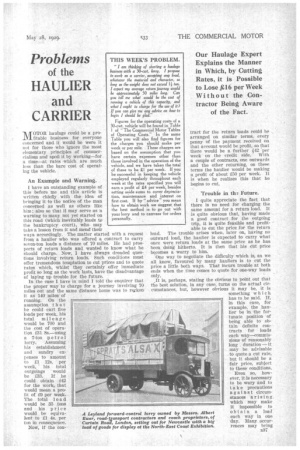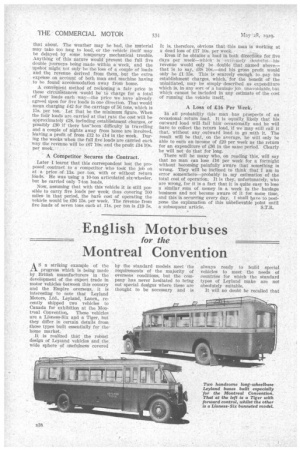Problems
Page 63

Page 64

If you've noticed an error in this article please click here to report it so we can fix it.
of the
HAULIER and CARRIER
MOTOR haulage could be a profitable business for everyone concerned and it would be were it not for those who ignore the most elementary principles of commercialism and spoil it by working—for a time—at rates -which are much less than the bare cost of operating the vehicle.
An Example and Warning.
I have an outstanding example of this before me and this article is written chiefly with the idea of bringing it to the notice of the man concerned as well as others like him; also so that it may serve as a warning to many not yet started on this road (which inevitably leads to the bankruptcy court), who may take a lesson from it and mend their ways accordingly. The matter started with a request from a haulier who was offered a contract to carry seven-ton loads a distance of 70 miles. He had prospects of return loads and wanted to know what he should charge. Now, I have always dreaded questions involving return loads. Such conditions must offer tremendous temptation to cut prices and to quote rates which, whilst they certainly offer immediate profit so long as the work lasts, have the disadvantage of laying up trouble for the future.
In the case I have in mind I told the enquirer that the proper way tocharge for a journey involving 70 miles out and the same distance home was to re,v.kon it as 140 miles of running. On the assumption that he could cart five loads per week, his total mileage would be 700 and the cost of operation £31 8s.—using a 7-ton petrol
lorry. Assuming his establishment and sundry expenses to amount to £1 12s. per week, his total outgoings ' would be 133. If he could obtain £42 for the work, that would mean a profit of £9 per week. The total load would be 35 tons and his price would be equivalent to £1 4s perton in consequence.
Now, if the con
tract for the return loads could be arranged on similar terms, every penny of the payment received on that account would be profit, so that there would be a further 02 per week on the credit side. With a couple of contracts, one outwards and the other returning, on these terms the haulier would be making a profit of about £50 per week. it is when he realizes this that he begins to cut.
Trouble in th Future.
I quite appreciate the fact that there is no need for charging the same amount for a return load. It is quite obvious that, having made a good contract for the outgoing trip, it is quite feasible and profitable to cut the price for the return load. The trouble arises when, later on, having no outward load, the haulier is expected to carry what once were return loads at the same price as he has been doing hitherto. It is then that his cut price
becomes a worry to him. .
One way to negotiate the difficulty which is, as we all know, favoured by many hauliers is to cut the price a little both ways. That incurs trouble at both ends when the time comes to quote for one-way loads only.
It is, perhaps, stating the obvious to point out that the best solution, in any case, turns on the actual circumstances, but, however obvious it may be, it is something which has to .be said. If, in this case, for example, the haulier be in the fortunate position of being able to obtain definite contracts for loads each way—commissions of reasonably long duration— it may be advisable to quote a cut rate, but it should be a fair price, subject to these conditions.
Even so, however, it is necessary to be wary and to take precautions against circumstances arising which may make it impossible to obtain a load each way in one day. Many occurrences may bring
that .about. The weather may be bad, the material may take too long to load, or the vehicle itself may be delayed by . some temporary , mechanical trouble. Anything of this -nature would" prevent the full five double journeys being made within n week, and the upshOt might not onlybethe loss of a couple of loads and the revenue derived . from them, but the extra expense on account of both man and machine having to be found accommodation away from home.
A convnient method of reckoning a fair price in these circuniStances would be to charge for a total of four loads each way—the price we have already agreed upon for five loads in one direction. That would mean charging £42 for the carriage of 56 tons, which is 15s. per ten. Let that be the minimum figure. When the foiir loads are carried at that rate the cost will be approximately £28, including establishment charges, or possibly 130 if there has-been difficulty in travelling and a couple of nights away from home are involved, leaVing,a profit of from £12 to 1.14: in the week. During. the weeks when the full five loads are carried each way the revenue will be £67 10s. and the profit £34 10s.
per week. . . .
A Competitor Secures the Contract.
Later I-learnt that this correspondent lost the proposed . contract to a competitor who 'took the job on at a price. of Ils, per ton, with or without return lauds. He was using a 10-ton articulated six-wheeler, but he carried only 7-ton loads.
Now, assuming that with this vehicle it is still possible to carry five loads per week, thus covering 700 miles in that period, the hare cost of operating the vehicle would be £36 15s. per week. The revenue from five loads of seven tons each at 11s, per ton is £19 5s. It is, therefore, obvious that this man is Working at
a dead loss a £17 10s. per week. ...
Even if he obtains a load in both directiOns for five days per week—which is extremely doninful—his revenue would only be double that named above— that is to say,. £38 10s.—and his gross profit would only he £1' 15s. This is scarcely enough to pay his establishment charges, which, for the benefit of the uninitiated, may be simply described as expenditure which is, in any sort of a haulage job. unavoidable, but which cannot be included in any estimate of the cost of running the vehicle itself.
A Loss of £16 Per Week.
In all probability this man has prospects of an occasional return load: It is equally, likely that his outward load will failhim occasionally and he will have to collect the return load, if we may still call it that, without any _outward load to go with it. The result will he that, on the average, he will only be able to earn an income of £20 per week as the return for an expenditure of £36 in the same period. Clearly he will not do that for long.
There will be many who, on reading this, will say that no man can lose 116 per week for a fortnight without becoming painfully aware that something is wrong. They will be inclined to think that I am in error somewhere—probably in. my estimation of the total cost of operation. It is they, unfortunately, who are wrong, for it is a fact that it is quite easy to lose a similar sum of money in a week in the haulage business and not become aware of it for some time, and this is occurring every day., II shall have to postpone the explanation of this unbelievable point until a subsequent article. S.T.R.




















































































































